《英语修辞学》第四章
- 格式:ppt
- 大小:422.50 KB
- 文档页数:16
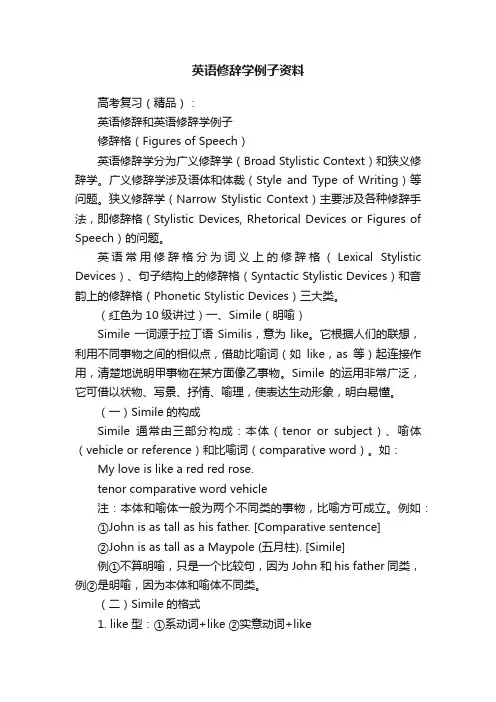
英语修辞学例子资料高考复习(精品):英语修辞和英语修辞学例子修辞格(Figures of Speech)英语修辞学分为广义修辞学(Broad Stylistic Context)和狭义修辞学。
广义修辞学涉及语体和体裁(Style and Type of Writing)等问题。
狭义修辞学(Narrow Stylistic Context)主要涉及各种修辞手法,即修辞格(Stylistic Devices, Rhetorical Devices or Figures of Speech)的问题。
英语常用修辞格分为词义上的修辞格(Lexical Stylistic Devices)、句子结构上的修辞格(Syntactic Stylistic Devices)和音韵上的修辞格(Phonetic Stylistic Devices)三大类。
(红色为10级讲过)一、Simile(明喻)Simile一词源于拉丁语Similis,意为like。
它根据人们的联想,利用不同事物之间的相似点,借助比喻词(如like,as等)起连接作用,清楚地说明甲事物在某方面像乙事物。
Simile的运用非常广泛,它可借以状物、写景、抒情、喻理,使表达生动形象,明白易懂。
(一)Simile的构成Simile通常由三部分构成:本体(tenor or subject)、喻体(vehicle or reference)和比喻词(comparative word)。
如:My love is like a red red rose.tenor comparative word vehicle注:本体和喻体一般为两个不同类的事物,比喻方可成立。
例如:①John is as tall as his father. [Comparative sentence]②John is as tall as a Maypole (五月柱). [Simile]例①不算明喻,只是一个比较句,因为John 和his father同类,例②是明喻,因为本体和喻体不同类。
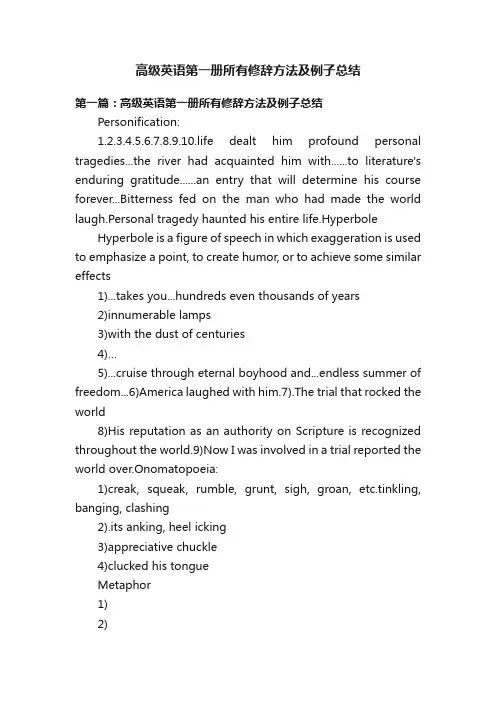
高级英语第一册所有修辞方法及例子总结第一篇:高级英语第一册所有修辞方法及例子总结Personification:1.2.3.4.5.6.7.8.9.10.life dealt him profound personal tragedies...the river had acquainted him with......to literature's enduring gratitude......an entry that will determine his course forever...Bitterness fed on the man who had made the world laugh.Personal tragedy haunted his entire life.Hyperbole Hyperbole is a figure of speech in which exaggeration is used to emphasize a point, to create humor, or to achieve some similar effects1)...takes you...hundreds even thousands of years2)innumerable lamps3)with the dust of centuries4)…5)...cruise through eternal boyhood and...endless summer of freedom...6)America laughed with him.7).The trial that rocked the world8)His reputation as an authority on Scripture is recognized throughout the world.9)Now I was involved in a trial reported the world over.Onomatopoeia:1)creak, squeak, rumble, grunt, sigh, groan, etc.tinkling, banging, clashing2).its anking, heel icking3)appreciative chuckle4)clucked his tongueMetaphor1)2)3)4)5)I had a lump in my throat At last this intermezzo came to an end...I was again crushed by the thought..hen the meaning...sank in, jolting me outof my sad reverie little old Japan adrift amid beige concrete skyscrapers...struggle between kimono and the miniskirtlittle old Japan----traditional floating houses6)I thought that Hiroshima still felt the impactHiroshima----people of Hiroshima, especially those who suffered from the A-bomb(keep her thoughts under control)E.g.1)Whether for him, the arch 3)The Nazi regime is devoid of all theme and principle except and racial domination.a.his wife shot him a swift, warning glance.(give sb.an angry and quick glare)b.The words spat forth with sudden savagery.(the detective said the words suddenly and savagely.)c.Her tone...withered...(become shorter from her frightening voice)d....self-assurance...flickered...(hesitate;move with a quick wavering light emotion)e.The Duchess kept firm tight rein on her racing mind.1)f.Her voice was a whiplash.i.(a heavy blow)2)g.eyes bored into himi.(look at him pointedly or sharply)3)h.I’ll spell it out.a)(explain or speak outfrankly and in detail)4)1.Mark Twain---Mirror of America5)2.Most Americans remember Mark Twain as the father of Huck Finn's idyllic cruisethrough eternal boyhood and Tom Sawyer's endless summer of freedom and adventure.6)3.The geographic core, in Twain's early years was the great valley of the MississippiRiver , main artery of transportation in the young nation's heart.7)4.The cast of characters set before him in his new profession was rich and varied — acosmos.8)Cast of characters: people of various sorts;cosmos: a place where one can find all sortsof characters9)5.Steamboat decks teemed not only with the main current of pioneering humanity, butits flotsam of hustlers, gamblers, and thugs as will.10)current: stream, here not a good choice for the verb teem.11)6.He went west by stagecoach and succumbed to the epidemic of gold and silver fever inNevada 's Washoe region.12)Succumbed…to: gave way to(yielded to, submitted to)the gold and silver rushprevailing in that area.13)7.For eight months he flirted with the colossal wealth available to the lucky and thepersistent, and was rebuffed.Flirted…wealth: did not try hard or persistently enough to get the colossal wealth…14)15)16)17)18)19)20)21)22)23)24)25)26)27)28)29)30)31)32)33)34)failed 8.From the discouragement of his mining failures, Mark Twain began digging his way to regional fame as a newspaper reporter and humorist.6.He went west by stagecoach and succumbed to the epidemic of gold and silver fever in Nevada 's Washoe region.Succumbed…to: gave way to(yielded to, submitted to)the gold and silver rush prevailing in that area.7.For eight months he flirted with the colossal wealth available to the lucky and the persistent, and was rebuffed.Flirted…wealth: did not try hard or persistently enough to get the colossal wealth…failed Digging …fame: working hard to gain regional fameMark Twain honed and experimented with his new writing muscles.Honed: sharpened/exercised.It is not suitable to say “sharpen one's muscles”.saw clearly ahead a black wall of night...the vast basin drained three-quarters of the settled United StatesAll would resurface in his books...that he soaked up...(submarine comes back to the surface, here reappear)When railroads began drying up the demand......took unholy verbal shots...my case would snowball into...our town...had taken on a circus atmosphere.The street...sprouted with...He thundered inhis sonorous organ tones.… had not scorched the infidels...…after the preliminary sparring over legalities…The case had erupted on my head.Now Darrow sprang his trump card by calling Bryan as a …But although Malone had won the oratorical duel with Bryan.Then the court broke into a storm of applause that …He accused Bryan of calling for a duel to the death …Irony: a figure of speech in which the meaning literally expressed is the opposite of the meaning intended and which aims at ridicule, humor or sarcasm.1)Hiroshima---the Liveliest City in Japan2)marching backwards to the glorious age of the 16th centuryAnti-climax : the sudden appearance of an absurd or trivial idea following a serious significant ideas and suspensions.This device is usu.aimed at creating comic or humorous effects.1)a town known throughout the world for its---oystersParallelismthe repetition of sounds, meanings and structures serve to order, emphasize, and point out relationsϒϒϒϒ(1)The past, with its crimes, its follies, and its tragedies...(2)the return of the bread-winner, of their champion, of their protector(3)We shall fight him by land, we shall fight him by sea, we shall fight him in the air.(4)are still primordial human joys, where maidens laugh and children play.ϒ(5)Let us...Let us...ϒ(6)He hopes...He hopes(7)Behind all this glare, behind all this stormLitotes(double negative)(语轻意重法,间接肯定法)a)A negative before another word to indicate a strong affirmative in the oppositedirection.b).Sarcasm1)ah, yes, for there are times when all pray2)There is some doubt about that.3)His reputation as an authority on Scripture is recognized throughout theworld.Alliteration(头韵)repetition of vowel sound1)2)3)4)its anking, heel ickingRhetorical question1)E.g.… but can you doubt what our policy will be?Assonance e.g.when bigots lighted faggots to burn...Repetition –Antithesis(两个结构相似但是意思相反的平行从句便是对偶句)1)E.g.Anyman or state who fights on against Nazidom will have our aid.Any man or state who marches with Hitler is our foe.(E.g.The coward does it with a kiss, the brave man a sword.)2)From them all Mark Twain gained a keen perception of the human race, of the difference between what people claim to be and what they really are.3)...took unholy verbal shots at the Holy Land...4)...a world which will lament them a day and forget them foreverSimilea)b)c)d)e)I see also the dull, drilled, docile, brutish masses of the Hun soldiery plodding...a memory that seemed phonographic...swept the arena like a prairie fire...a palm fan like a sword...The oratorical storm … blew up in the little court in Dayton swept like a freshwind …Periodic sentence(圆周句)Periodic sentences achieve forcefulness by suspense.The essential elements in the sentence are withheld until the end.松散句把主要意思放在次要意思之前,先说最重要的事情,因而读者在看到最初的几个词后就知道这句话的意思。
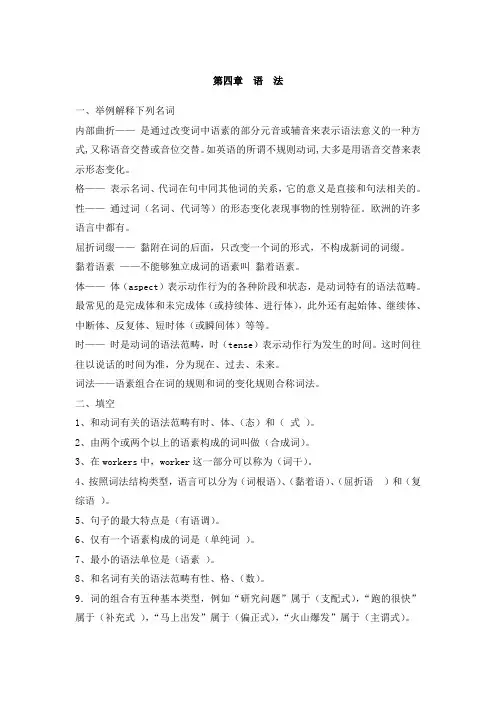
第四章语法一、举例解释下列名词内部曲折——是通过改变词中语素的部分元音或辅音来表示语法意义的一种方式,又称语音交替或音位交替。
如英语的所谓不规则动词,大多是用语音交替来表示形态变化。
格——表示名词、代词在句中同其他词的关系,它的意义是直接和句法相关的。
性——通过词(名词、代词等)的形态变化表现事物的性别特征。
欧洲的许多语言中都有。
屈折词缀——黏附在词的后面,只改变一个词的形式,不构成新词的词缀。
黏着语素——不能够独立成词的语素叫黏着语素。
体——体(aspect)表示动作行为的各种阶段和状态,是动词特有的语法范畴。
最常见的是完成体和未完成体(或持续体、进行体),此外还有起始体、继续体、中断体、反复体、短时体(或瞬间体)等等。
时——时是动词的语法范畴,时(tense)表示动作行为发生的时间。
这时间往往以说话的时间为准,分为现在、过去、未来。
词法——语素组合在词的规则和词的变化规则合称词法。
二、填空1、和动词有关的语法范畴有时、体、(态)和(式)。
2、由两个或两个以上的语素构成的词叫做(合成词)。
3、在workers中,worker这一部分可以称为(词干)。
4、按照词法结构类型,语言可以分为(词根语)、(黏着语)、(屈折语)和(复综语)。
5、句子的最大特点是(有语调)。
6、仅有一个语素构成的词是(单纯词)。
7、最小的语法单位是(语素)。
8、和名词有关的语法范畴有性、格、(数)。
9.词的组合有五种基本类型,例如“研究问题”属于(支配式),“跑的很快”属于(补充式),“马上出发”属于(偏正式),“火山爆发”属于(主谓式)。
10、能够改变词类的是(构词)词缀。
11、表达语法意义的语法形式除了有类的配列之外,还有(形态的一致性配合)和(虚词)。
三、单项选择1、下列各组词中全部属于复合词的一组是(D )A.大学、人民、(英)reader B.劳动、阿姨、(英)railwayC.瓶子、教室、(英)unhappy D.道路、材料、(英)classroom2、与“春光明媚”结构相同的组合是(A )A.阳光充足 B.已经开始C.调查研究 D.工人和农民3、以下关于句法变换陈述正确的一项是( B )A.句法变换反映的是句子之间的关系B.句法变换可以区分句法多义C.容许变换说明一个语言的语序是自由的D.变换从不改变句子的语义4、区分词类最重要的依据是(C)A.意义 B、形态变化 C、句法功能 D、语言的类型特点5、现代汉语普通话中的“花儿”是()A .单纯词B .派生词 C.复合词 D.语素6、分析以下Michoacan Aztec语中的一些词以及英语翻译。
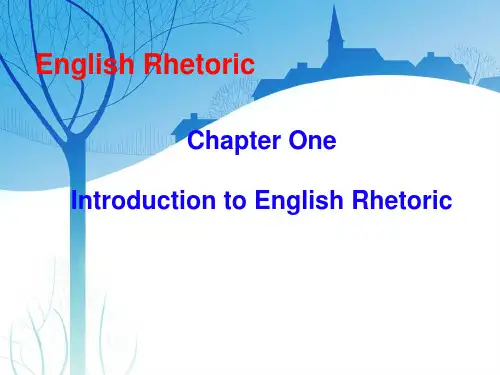

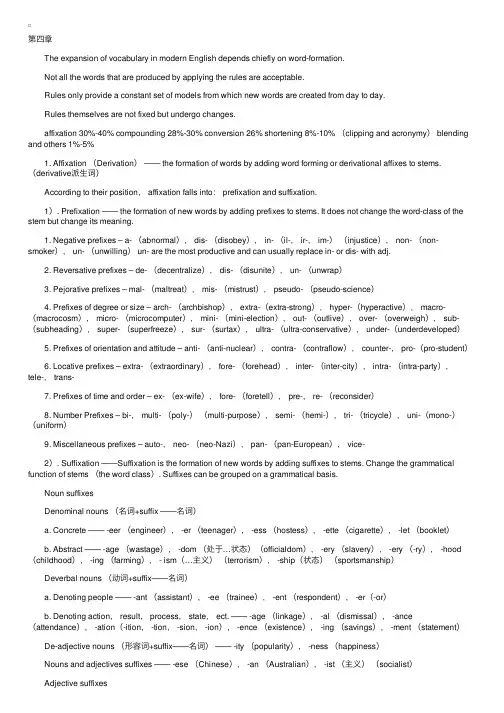
第四章 The expansion of vocabulary in modern English depends chiefly on word-formation. Not all the words that are produced by applying the rules are acceptable. Rules only provide a constant set of models from which new words are created from day to day. Rules themselves are not fixed but undergo changes. affixation 30%-40% compounding 28%-30% conversion 26% shortening 8%-10% (clipping and acronymy) blending and others 1%-5% 1. Affixation (Derivation) —— the formation of words by adding word forming or derivational affixes to stems.(derivative派⽣词) According to their position, affixation falls into: prefixation and suffixation. 1). Prefixation —— the formation of new words by adding prefixes to stems. It does not change the word-class of the stem but change its meaning. 1. Negative prefixes – a- (abnormal), dis- (disobey), in- (il-, ir-, im-)(injustice), non- (non-smoker), un- (unwilling) un- are the most productive and can usually replace in- or dis- with adj. 2. Reversative prefixes – de- (decentralize), dis- (disunite), un- (unwrap) 3. Pejorative prefixes – mal- (maltreat), mis- (mistrust), pseudo- (pseudo-science) 4. Prefixes of degree or size – arch- (archbishop), extra-(extra-strong), hyper-(hyperactive), macro-(macrocosm), micro- (microcomputer), mini- (mini-election), out- (outlive), over- (overweigh), sub-(subheading), super- (superfreeze), sur- (surtax), ultra- (ultra-conservative), under-(underdeveloped) 5. Prefixes of orientation and attitude – anti- (anti-nuclear), contra- (contraflow), counter-, pro-(pro-student) 6. Locative prefixes – extra- (extraordinary), fore- (forehead), inter- (inter-city), intra- (intra-party),tele-, trans- 7. Prefixes of time and order – ex- (ex-wife), fore- (foretell), pre-, re- (reconsider) 8. Number Prefixes – bi-, multi- (poly-)(multi-purpose), semi- (hemi-), tri- (tricycle), uni-(mono-)(uniform) 9. Miscellaneous prefixes – auto-, neo- (neo-Nazi), pan- (pan-European), vice- 2). Suffixation ——Suffixation is the formation of new words by adding suffixes to stems. Change the grammatical function of stems (the word class). Suffixes can be grouped on a grammatical basis. Noun suffixes Denominal nouns (名词+suffix ——名词) a. Concrete —— -eer (engineer), -er (teenager), -ess (hostess), -ette (cigarette), -let (booklet) b. Abstract —— -age (wastage), -dom (处于…状态)(officialdom), -ery (slavery), -ery (-ry), -hood (childhood), -ing (farming), - ism(…主义)(terrorism), -ship(状态)(sportsmanship) Deverbal nouns (动词+suffix——名词) a. Denoting people —— -ant (assistant), -ee (trainee), -ent (respondent), -er(-or) b. Denoting action, result, process, state, ect. —— -age (linkage), -al (dismissal), -ance (attendance), -ation(-ition, -tion, -sion, -ion), -ence (existence), -ing (savings), -ment (statement) De-adjective nouns (形容词+suffix——名词) —— -ity (popularity), -ness (happiness) Nouns and adjectives suffixes —— -ese (Chinese), -an (Australian), -ist (主义)(socialist) Adjective suffixes Denominal suffixes —— -ed (wooded), -ful (successful), -ish (foolish), -less (priceless), -like (lady-like), -ly (friendly), -y (smoky) -al(-ial, -ical)(cultural, residential), -esque (picturesque), -ic (economic), -ous(-eous, -ious)(coutageous) -ic and –ical can be affixed to the stem in some cases, but differ in meaning. Historic (important in history) historical (of history) Classic (great, memorable) classical (of Latin or Greek) Comic (of comedy) comical (funny) Economic (in the economy) economical (money-saving) Electric (powered by electricity) electrical (of electricity) Deverbal suffixes —— -able (-ible)(washable), -ive(-ative, -sive)(active, decisive) Adverb suffixes —— -ly (calmly), -ward(s)(homewards), -wise (clockwise) Verb suffixes —— -ate(originate), -en (darken), -(i)fy (beautify), -ize (ise)(modernize) Nik most of them are considered slang. 2. Compounding (Composition)——Compounding is a process of word-formation by joining two or more stems. Compounds- a lexical unit consisting of more than one stem and functioning both grammatically and semantically as a single word. 三种形式solid, hyphenated, open 1). Characteristics (differ from free phrases) Phonetic features Compound (not absolute) Free phrase Stress on the first element Stress on the second element Semantic features Compounds are different from free phrases in semantic unity. Every compound should express a single idea just as one word. A lot of compounds are transparent and the meaning can be inferred from the separate elements of compounds. Grammatical features A compound plays a single grammatical role in a sentence. In adjective-noun compounds, the adjective element cannot take inflectional suffixes. Compound Free phrase fine art finer art Formation Most compounds consist of 2 stems, but are formed on a rich variety of patterns and the internal grammatical relationship within the words is considered complex. Noun compounds Adjective compounds Verb compounds (through conversion and back formation) Back formed verb compounds are formed mainly by dropping the suffixes, -er, -ing,-ion, -etc. 3.Conversion (zero-derivation, functional shift) ——Conversion is the formation of new words by converting words of one class to another class. These words are new only in a grammatical sense. The most productive is between nouns and verbs. A change of grammatical function The different range of meaning Conversion to noun Verb to noun-almost all monomorphemic verbs can be used as nouns. 1. State (of mind or sensation) 2. Event or activity 3. Result of the action 4. Doer of the action 5. Tool or instrument 6. Place of the action Adjective to noun (full conversion, partial conversion) 1. Words fully converted-a noun converted from an adjective has all the characteristics of nouns. It can take an identical article or –e(s). 2. Words partially converted – do not possess all the qualities a noun does. They must be used together with definite articles. They retain some of the adjective features. Words of this class generally refer to a group of the kind. 3. Miscellaneous conversion Conversion to verbs 1. Noun to verb-verbs of this kind are all transitive. 2. Adjective to verb 3. Miscellaneous conversion 4.Blending—is the word formation by combining parts of two words or a word plus a part of another word. Head + tail autocide / motel/ slurb / cremains / chunnel Head + head comsat / telex / Amerind / sitcom / FORTRAM Head + word medicare / Eurasia / telequiz / atuocamp Word + tail lunarnaut / bookmobile / workfare / tourmobile The overwhelming majority of blends are nouns, very few are verbs and adjectives are even fewer. 5.Clipping – shorten a longer word by cutting a part of the origin and using what remains instead. People tend to ve economical in writing and speech to keep up the tempo of new life style. Front clipping Quake (earthquake) / Copter(helicopter)/ scope (telescope)/ phone (telephone) Back clipping Dorm(dormitory) / momo()/stereo()/gent()/fan()/disco() Front and back clipping Phrase clipping Pub()/pop()/zoo()/perm() 6.Acronymy – joining the initial letters of names of social and political organizations or special phrases and technical terms Initialisms are words formed from the initial letters of words and pronounced as letters. It’s one of the word formations of acronymy. E.g. IMF/ai em ef/=International Monetary Fund. Acronyms are words formed from the initial letters of word and pronounced as words. . It’s one of the word formations of acronymy. E.g. NATO/'neito/=North Atlantic Treaty Organization. 7.Back-formation—— is a process of word-formation by which a word is created by the deletion of a supposed affix. It is considered to be the opposite process of suffixation. 8.Words from proper names modern English has a large number of words which come from proper nouns. They include 1. Names of people Words of this group are from names of scientists, investors, etc. these terms are used as measurements. Some words are from characters in mythology. Some are from historical figures. Some words are from characters in literary books. s of places Many words denoting products, objects or materials come from the names of places where they were first produced. s of books 4.Tradenames When proper nouns are communized, many of them have lost their original identity. They can be converted to other classes. These words can also take suffixes. Words that are communized from proper nouns have rich culture associations and thus stylistically vivid, impressive and though-provoking.。
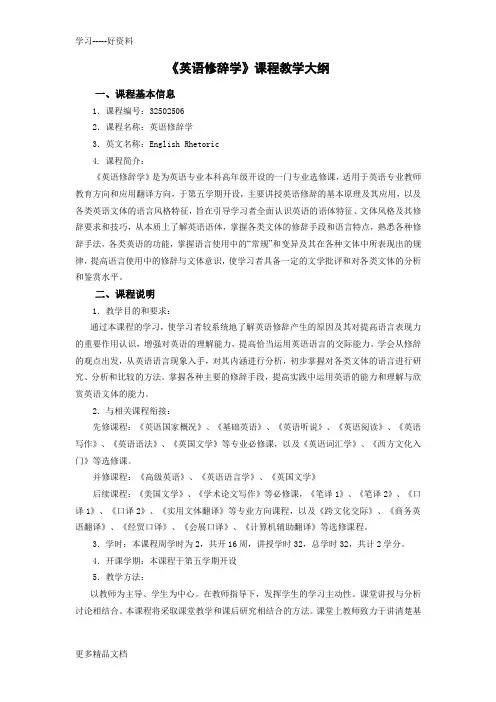
《英语修辞学》课程教学大纲一、课程基本信息1.课程编号:325025062.课程名称:英语修辞学3.英文名称:English Rhetoric4. 课程简介:《英语修辞学》是为英语专业本科高年级开设的一门专业选修课,适用于英语专业教师教育方向和应用翻译方向,于第五学期开设,主要讲授英语修辞的基本原理及其应用,以及各类英语文体的语言风格特征,旨在引导学习者全面认识英语的语体特征、文体风格及其修辞要求和技巧,从本质上了解英语语体,掌握各类文体的修辞手段和语言特点,熟悉各种修辞手法,各类英语的功能,掌握语言使用中的“常规”和变异及其在各种文体中所表现出的规律,提高语言使用中的修辞与文体意识,使学习者具备一定的文学批评和对各类文体的分析和鉴赏水平。
二、课程说明1.教学目的和要求:通过本课程的学习,使学习者较系统地了解英语修辞产生的原因及其对提高语言表现力的重要作用认识,增强对英语的理解能力,提高恰当运用英语语言的交际能力。
学会从修辞的观点出发,从英语语言现象入手,对其内涵进行分析,初步掌握对各类文体的语言进行研究、分析和比较的方法。
掌握各种主要的修辞手段,提高实践中运用英语的能力和理解与欣赏英语文体的能力。
2.与相关课程衔接:先修课程:《英语国家概况》、《基础英语》、《英语听说》、《英语阅读》、《英语写作》、《英语语法》、《英国文学》等专业必修课,以及《英语词汇学》、《西方文化入门》等选修课。
并修课程:《高级英语》、《英语语言学》、《英国文学》后续课程:《美国文学》、《学术论文写作》等必修课,《笔译1》、《笔译2》、《口译1》、《口译2》、《实用文体翻译》等专业方向课程,以及《跨文化交际》、《商务英语翻译》、《经贸口译》、《会展口译》、《计算机辅助翻译》等选修课程。
3.学时:本课程周学时为2,共开16周,讲授学时32,总学时32,共计2学分。
4.开课学期:本课程于第五学期开设5.教学方法:以教师为主导、学生为中心。
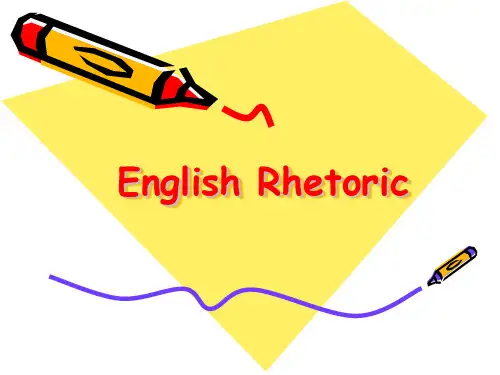
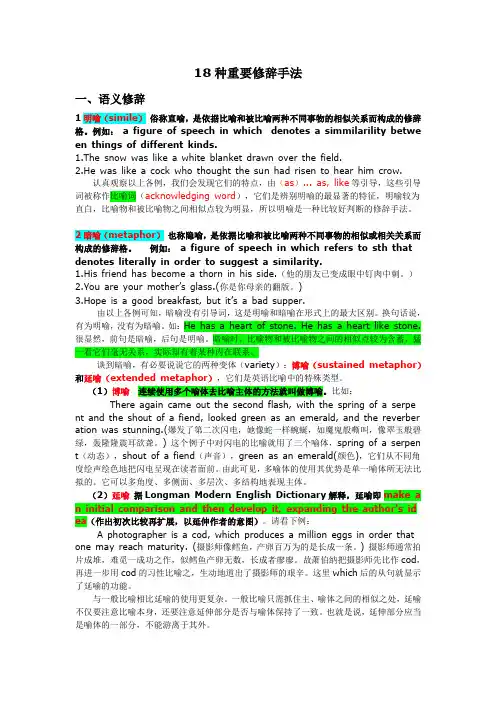
18种重要修辞手法一、语义修辞1明喻(simile)俗称直喻,是依据比喻和被比喻两种不同事物的相似关系而构成的修辞格。
例如:a figure of speech in which denotes a simmilarility betwe en things of different kinds.1.The snow was like a white blanket drawn over the field.2.He was like a cock who thought the sun had risen to hear him crow.认真观察以上各例,我们会发现它们的特点,由(as)... as, like等引导,这些引导词被称作比喻词(acknowledging word),它们是辨别明喻的最显著的特征,明喻较为直白,比喻物和被比喻物之间相似点较为明显,所以明喻是一种比较好判断的修辞手法。
2暗喻(metaphor)也称隐喻,是依据比喻和被比喻两种不同事物的相似或相关关系而构成的修辞格。
例如:a figure of speech in which refers to sth that denotes literally in order to suggest a similarity.1.His friend has become a thorn in his side.(他的朋友已变成眼中钉肉中刺。
)2.You are your mother’s glass.(你是你母亲的翻版。
)3.Hope is a good breakfast, but it’s a bad supper.由以上各例可知,暗喻没有引导词,这是明喻和暗喻在形式上的最大区别。
换句话说,有为明喻,没有为暗喻。
如:He has a heart of stone. He has a heart like stone.很显然,前句是暗喻,后句是明喻。
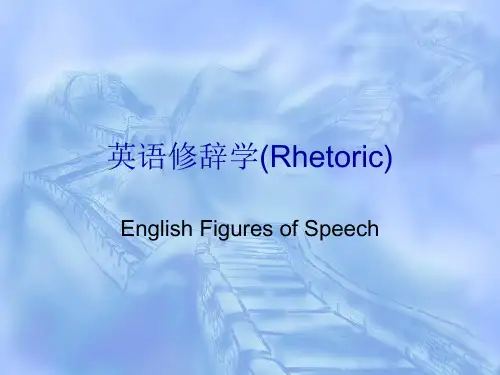
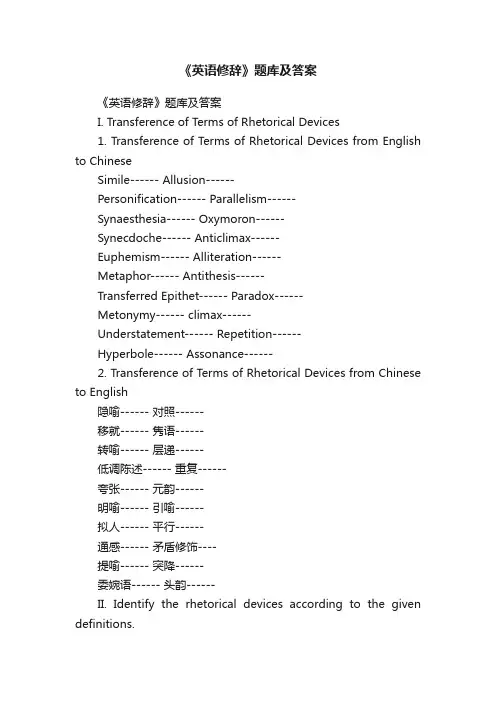
《英语修辞》题库及答案《英语修辞》题库及答案I. Transference of T erms of Rhetorical Devices1. Transference of Terms of Rhetorical Devices from English to ChineseSimile------ Allusion------Personification------ Parallelism------Synaesthesia------ Oxymoron------Synecdoche------ Anticlimax------Euphemism------ Alliteration------Metaphor------ Antithesis------Transferred Epithet------ Paradox------Metonymy------ climax------Understatement------ Repetition------Hyperbole------ Assonance------2. Transference of Terms of Rhetorical Devices from Chinese to English隐喻------ 对照------移就------ 隽语------转喻------ 层递------低调陈述------ 重复------夸张------ 元韵------明喻------ 引喻------拟人------ 平行------通感------ 矛盾修饰----提喻------ 突降------委婉语------ 头韵------II. Identify the rhetorical devices according to the given definitions.1. It’s repetition of an initial sound, usually of a conson ant or cluster, in two or more words of a phrase, line of poetry, etc.A. ParallelismB. MetonymyC. AlliterationD. Metaphor2. It’s a figure of speech containing an implied comparison, in which a word or phrase ordinarily and pri marily used of one thing is applied to another.A. MetaphorB. HyperboleC. SimileD. Personification3. It’s the humorous use of words, or of words which are formed or sounded alike but have different meanings, in such a way as to play on two or more of the possible applications; a play on words.A. AllusionB. PunC. ClimaxD. Oxymoron4. It’s a figure of speech that consists in using the name of one thing for that of something else with w hich it is associated.A. ParallelismB. MetonymyC. AlliterationD. Metaphor5. It’s a statement that is not strong enough to express facts or feelings with full force; or It’s a statement that expresse s an idea, etc, too weakly.A. ParallelismB. ClimaxC. Rhetorical QuestionD. Understatement6. It’s a figure of speech in which something of an unpleasant, distressing, or indelicate nature is described in less offensive terms, as in the expressions “under the weather” for “ill” or “passed away” for died”.A. MetaphorB. HyperboleC. EuphemismD. Parallelism7. It’s usually an implicit reference, perhaps to another work of literature or art, to a person or an event.A. AllusionB. SimileC. MetaphorD. Synecdoche8. It’s a figure of speech that consists of phrases or sentences of similar construction and meaning placed side by side, balancing each other.A. ParallelismB. AntithesisC. IronyD. Repetition9. It’s a figure of speech that combines incongruous and apparently contradictory words and meaning for a special effect.A. AllusionB. PunC. ClimaxD. Oxymoron10. It is a sentence in which the last part expresses something lower than the first. In fact, a bathetic declension from a noble tone to one less exalted. The effect can be comic and is often intended to be so.A. RepetitionB. AnticlimaxC. ParadoxD. Climax11. It’s a figure of speech in which one thing is likened to another, in such a way as to clarify and enhance an image. It is an explicit comparison.A. MetaphorB. HyperboleC. SimileD. Personification12. It’s a figure of speec h in which human qualities and abilities are attributed to inanimate objects, animals, abstractions, and eventsA. MetaphorB. HyperboleC. SimileD. Personification13. It’s a figure of speech in which a sensation produced in one modality when a stimulus is applied to another modality, as when the hearing of a certain sound induces the visualization of a certain colorA. SynaesthesiaB. AntithesisC. Oxymoron14. It’s a figure of speech in whi ch a part is used for a whole, an individual for a class, a material for thing, or reverse of any of these.A. SimileB. MetaphorC. AllusionD. Synecdoche15. It’s a figure of speech that greatly exaggerates the truth.A. MetaphorB. HyperboleC. SimileD. Personification16. The rhetorical opposing or contrasting of ideas by means of grammatically paralleled arrangements of words, clauses, or sentencesA. SynaesthesiaB. AntithesisC. OxymoronD. Metonymy17. It refers to the repeating of any element in an utterance, including sound… a word or phrase, a pattern of accents.. or an arrangement of lines…A. RepetitionB. AntithesisC. AlliterationD. Parallelism18. It’s a method of humorous or subtly sarcastic expression in which the intended meaning of the words used is the direct opposite of their usual sense.B. HyperboleC. IronyD. Simile19. It’s a literary or artis tic work that imitates the characteristic style of an author or a work for comic effect or ridicule.A. MetaphorB. PunC. SimileD. Parody20. A figure of speech in which a single word, usually a verb or adjective, is syntactically related to two or more words, with only one of which it seems logically connected.A. RepetitionB. AntithesisC. ZeugmaD. ParallelismIII. Identify the rhetorical devices employed by the boldfaced words in the following sentences.1. O dear! O dear! What shall I do? I have lost my love and my lipstick too.A. RepetitionB. AnticlimaxC. ParadoxD. Climax2. Australia is so kind, just tickle her with a hoe, and she laughs with harvest.A. MetaphorB. HyperboleC. SimileD. Personification3. My heart is like a singing bird.A. MetaphorB. ParodyC. SimileD. Oxymoron4. When Della had finished crying, she went to the window and looked out sadly at a grey cat walking along a grey fence in a grey back-yard.A. ParallelismB. AntithesisC. IronyD. Repetition5. On the 14th of March, at a quarter to three in the afternoon, the great living thinker ceased to think. He had been left alone for scarcely two minutes, and when we came back we found him in his armchair, peacefully gone to sleep but---- forever.A. MetaphorB. HyperboleC. EuphemismD. Parallelism6. O, wind, if winter comes, can spring be far behind?A. ParallelismB. ClimaxC. Rhetorical QuestionD. Understatement7. Of all the students in the class I like him the best.A. AnastropheB. AnticlimaxC. Rhetorical QuestionD. Understatement8. You can ask him for the meaning of the word. He is like a walking dictionary.A. MetaphorB. HyperboleC. SimileD. Oxymoron9. Books are the ever-burning lamps.A. MetaphorB. HyperboleC. SimileD. Oxymoron10. Money makes the mare go.A. ParadoxB. AssonanceC. AlliterationD. Simile11. There was an audible stillness, in which the common voice sounded strange.A. MetaphorB. HyperboleC. SimileD. Oxymoron12. Praise is like sunlight to the human spirit we cannot flower and grow without it.A. MetaphorB. HyperboleC. SimileD. Oxymoron13. One teacher writes that instead of drowning students’ compositions in critical red ink, the teacher will get far more constructive results by finding one or two things which have been done better than last time, and commenting favorably on them.A. ParallelismB. Transferred EpithetC. AlliterationD. Metaphor14. He looked at me with a bitter look.A. SynaesthesiaB. AntithesisC. OxymoronD. Metaphor15. ---Why are Sunday and Saturday the strongest days in a week?---Because the rest are week (weak) days.A. MetaphorB. PunC. SimileD. Irony16. All the world’s a stage, and all the men and women merely players.A. AntithesisB. HyperboleC. SimileD. Personification17. ---Why can you never expect a fisherman to be generous?---Because his business make him sell fish (selfish).A. MetaphorB. PunC. SimileD. Irony18. Women were running out to the line of march, crying and laughing and kissing the men good-bye.A. AntithesisB. HyperboleC. RepetitionD. Parallelism19. Money is a bottomless sea, in which honor, conscience, and truth may be drowned.A. MetaphorB. PunC. SimileD. Irony20.I wish I could write better.A. PunB. HyperboleC. ClimaxD. UnderstatementIV. Identify the rhetorical devices employed in the following sentences.1. Praise is like sunlight to the human spirit we cannot flower and grow without it. ( )2. One teacher writes that instead of drowning st udents’ compositions in critical red ink, the teacher will get far more constructive results by finding one or two things which have been done better than last time, and commenting favorably on them. ( )3. And, it being low water he went out with the tide.( )4. They were short of hands at harvest time.( )5. In the dock, she found scores of arrows piercing her chest.( )6. With this faith we will be able to work together, to pray together, to struggle together, to go to jail together, to stand up for freedom together, knowing that we will be free one day.( )7. The drunkard smashed the glasses, upturned the table, and hit an old woman.( )8. One mad action is not enough to prove a man mad.( )9. He intended to take an opportunity this afternoon of speaking to Irene. A word in time saves nine.( )10. No X in Nixon.( )11. All the world’s a stage, a nd all the men and women merely players.( )12. He looked at me with a bitter look. ( )13. The man is no fool.( )14. You want your pound of flesh, don’t you?( )15. The child is father of the man.( )16. Perhaps, perhaps Mera might come.( )17. A professor tapped on his desk and shouted, “Gentlemen, order!”The entire class yelled, “Beer.” ( )18. I used to organize my father’s tools, my mother’s kitchen utensils, my sister’s boyfriend s.( )19. A man from the continent was traveling in England. He had c aught a very bad cold. He coughed day and night… He put on his coat and hat and went to a chemist’s. When asked what he wanted, the traveler said, “I want something for my cow,please.”( )20. Have you ever been to an Irish Wedding? I have just returned fr om one…21. Wit without learning is like a tree without fruit.( )22. I fall upon the thorns of life! I bleed!( )23. The senator pledged to oppose war, fight poverty, protect individual freedom and name a new state flower. ( )24. It is a quarter to five in the morning, the sun has already climbed above the horizon; the birds are busy celebrating the new day and have eagerly been in search of food. ( )25.Who wouldn’t have dreamed of becoming rich overnight? ( )26. What she had said I didn’t hear. ( )V. Two or more than two rhetorical devices are used in the following sentences. Read and select the rhetorical devices in each sentence.1. Time is like a fashionable host, that slightly shakes his passing guest by the band; and with his arms stretched, a s he would fly, grasps in the comer.The welcomes ever smile, and farewell goes out sighing.A. MetaphorB. HyperboleC. SimileD. Personification2. The seed ye sow, another reaps;The wealth ye find, another keeps;The robes ye weave, another wears;The arms ye forge, another bears.A. ParallelismB. AntithesisC. AlliterationD. Repetition3. Every man has in himself a continent of undiscovered character. Happy is he who acts the Columbus to his own soul.A. SimileB. MetaphorC. AllusionD. Synecdoche4. Miss Bolo went straight home in a flood of tears and a sedan chair.A. MetaphorB. HyperboleC. SimileD. Syllepsis5. These little thoughts are the rustles of leaves; they have their whisper of joy in my mind.A. MetaphorB. HyperboleC. SimileD. Personification6. A drop of ink may make a million think.A. PunB. AntithesisC. AlliterationD. Metonymy7. How soon hath Time, the subtle thief of youth, stolen on his wing my three and twentieth year!A. MetaphorB. HyperboleC. SimileD. Personification8. She did experiments after experiments. There was failure, success, more failure, a little success, a little more success.A. MetonymyB. ClimaxC. HyperboleD. Repetition9. The mother is undergoing the joyful pain, and the painful joy of childbirth.A. HyperboleB. AntithesisC. OxymoronD. Metonymy10. Why are lawyers all uneasy sleepers? Because they lie first on one side and then on the other, and remain wide wake all the time.A. PunB. AnticlimaxC. Rhetorical QuestionD. Understatement11. A lie can travel half way around the world while the truth is putting on its shoes.A. MetaphorB. HyperboleC. SimileD. Personification12. It is useless for the sheep to pass resolutions in favor of vegetarianism while the wolf remains of a different opinion.A. MetaphorB. HyperboleC. SimileD. Personification13. He was such a marvelous teacher that whenever he recognized a spark of genius you could be sure he’d water it.A. MetaphorB. UnderstatementC. IronyD. Paradox14. Polly, I love you. You are the whole world to me, and the moon and the stars and the constellation of out space.A. PunB. HyperboleC. ClimaxD. Understatement15. Then Night, like some great loving mother, gently lays her hand at our fevered head, and turns our little tear-stained face up to hers, and smiles.A. MetaphorB. HyperboleC. SimileD. Personification16. On Sunday they pray for you and on Monday they prey on you.A. AntithesisB. ParallelismC. AlliterationD. PunVI. Revise the following sentences with the given rhetorical devices.1. David’s beloved grandfather passed away last week.2. He looked at me with a sad look.3. Sorry, my pocket can’t afford such a pair of shoes.4. I never believe until then that any meal could defeat me, but on that day I met my Waterloo.5. Her hostility melted.6. She is lovely, kind-hearted and has a quick mind.7. I was knocked down by a motorcycle, but it was not serious.8. He is a man of wide experience and who is also very popular with the farmers.9. To chew carefully and eating slowly are necessary for good digestion.10. On the train I met with a girl from my hometown and who just graduated from Tianjin University with MA degree.11. My heart is like a singing bird.12. She is as cool as a cucumber..13. They were short of hands at harvest time.14. The bad news was a dagger into her heart.15. They stormed the speaker with questions.16. He looked at me with a bitter look17. You want your pound of flesh?18. He doesn’t have an idea of his own. He just parrots what other people say.19. His grandfather passed away recently.20. Her happiness vanished like the morning dew.VII. Find the rhetorical devices employed in the following passage.AA Dream of Rainbow(1) When I was small, I often gazed into the sky, It was bright blue, with a few sheets of cloud floating. Especially after a rain,after a rain, there would appear a splendid and glamorous rainbow, which was like a great bridge hung in thesky. How I wished I had been an eagle soaring up to the bridge! I was obsessed with it. Grandma told me that in the heaven lived supernatural beings, and that it was the kind-hearted and well-behaved people who could step into the heaven through the rainbow. She taught me to be a good boy; then I would have a chance to walk on the rainbow some day.(2) It was a beautiful dream. Gradually, I grew up to be a high school student. However, I buried myself in lesson, exercises and even boring tests all day long. Day in and day out. Such a pressing routine has deprived me of my interest as well as my chance to gaze into the sky.(3) In the summer of 1998,after finished the college entrance examination, I had time for relaxing myself at last. One day, shortly after a heavy thundershower, I opened the window and then pleasant smells of the earth greeted me. I couldn’t help breathing deeply with my eyes closed. After some while, I opened my eyes satisfactorily. Just guess what I saw. The blue sky! Or rather the blue-gray sky. It seemed that I met an old friend, who had changed so much that I could hardly recognize him. I craned my head out to look for the rainbow of which I have a deep love. But to my disappointment, she didn’t appear in the sky. Why could it be that!(4) Now, I come to understand it is the pollution that made the rainbow so strange to me and compelled her to be away from me. In the past few years, economic prosperity has been greatly promoted at the cost of air and environmental pollution. As result, while people are enjoying the prosperity, they are suffering a great deal from pollution. No wonder scientists say this is therevenge of nature! It is never too late to mend anyhow. Now more and more people have become coolly aware of its harmful consequences; and effective measures have been taken for anti-pollution. I believe that pollution will be able to disappear in the near future and our sky will be able to renew its bright blue as it used to.(5) Last night, I dreamed a beautiful dream: I saw a rainbow that has been never seen for ages. Then I flew in the sky to the rainbow as lf I had wings. When I landed on such a gorgeous bridge, all supernatural beings gave me a warm welcome…Rhetorical Devices used:Paragraph(1)__________________________________________________________________________________________________________Paragraph(2)__________________________________________________________________________________________________________Paragraph(3)__________________________________________________________________________________________________________Paragraph(4)__________________________________________________________________________________________________________Paragraph(5)________________________________________________________________________________________________________BThe Olympic Aspiration of an Ordinary Chinese Farmer(1) The Beijing’s bid for the 2008 Olympics reflects the common aspiration of the 1.3 billion Chinese people. Apart fromBeijing, every city of China has been launching a series of rich and varied supporting activities. However, the country folks are no less enthusiastic than the town people, and they have their own way. Comparatively speaking, the events in cities are tremendous in power and grandeur; while the activities in the countryside are like a gentle breeze anda mild rain. The earnest aspiration of rural resident for the Olympic bid can be mirrored just from an ordinary Chinese farmer -----my uncle, who is 68 years old, living in a small village about 100km east of Shijiazhuang, Hebei Privine.(2) During the week-long Labour Day holiday, I went to see him. I was very happy to find him hale and hearty. But nine years ago, he suffered from severe T.B. Ever since his recovery a year later, he has taken exercise: doing Taijiquan, kicking shuttlecock, especially having a long walk every morning at all seasons. His good health is attributed to his regular physical exercise, and he thus realize what an important role it plays in building up the health of a person as well as that of the whole nation.(3) Last year, when he heard the news on TV that Beijing decided to participate in the bid for hosting the 2008 Olympic Games, he felt quite excited and threw himself into fervent support. Since then, reading newspapers becomes a must every day. He has accumulated an intimate knowledge of the Olympics, such as its brief history, its creed, its motto,(4) My visit to him was turned into a sole conversation about the Olympics. After a comprehensive analysis, he told me that he has o ne gratification and one anxiety about the Beijing’s bid. His gratification is that the Beijing’s bid enjoys worldwide support, and most countries in the world favor Beijing as a host of the 2008 Summer Games. As to his anxiety, that is Paris andToronto are the two most formidable rivals for Beijing. Over 90 per cent of all 123 IOC members have ever been to Paris, but only 40 per cent have been to Beijing. More unfavorably, the US congress created all sorts of obstacles in an attempt to block China’s bidding wheel. “What does it matter if we meet some difficulties? ” he said resolutely. “ I am still confident of the final success.” He expressed his hope that he would go to Beijing to watch the Games in 7 years.(5) Now, the rural areas have seen a steadily growing economy. The great majority of farmers enjoy a high standard of living. They know that the hosting of the Games will be a boost to the country’s econom ic prosperity and tourism, and can bring them a better life. At the same time, people from all over the world can get a good opportunity to see through sport a real China ----its honest and hospitable people, its ancient and splendid culture, its 300-year-old and vitalizing capital, its rural scenery, its historical sites, its scenic attraction…(6) The Beijing 2008 Summer Olympics is being longed for by all Chinese people from as high as state leaders to as country folks like my uncle.Rhetorical Devices used:Paragraph(1)__________________________________________________________________________________________________________Paragraph(2)__________________________________________________________________________________________________________Paragraph(3)__________________________________________________________________________________________________________Paragraph(4)__________________________________________________________________________________________________________Paragraph(5)__________________________________________________________________________________________________________Paragraph(6)__________________________________________________________________________________________________________CAn Unforgettable Trip(1) The train was cracking for Qinhuangdao -----a beautiful city which I had been longing for, and which often appeared in my dreams. My thoughts had already flown out to the sea: the red sun shining in the sky, millions of shells and pebbles on the beach, lots of people playing in the water, and the waves breaking and foaming. With the dreamlike scene, smile crept up and stayed on my face. Four hours passed, and we arrived at our destination late at night.(2) We set out very early the next morning. Just several minutes later, the wind brought us the scent of the sea, and the sea greeted us. Jumping off the car, I ran wildly along the shore.I was amazed at the vast surface and the blue water, which were far more magnificent than I had imaged. Some birds were flying above and singing beautiful songs; A couple of ships were sailing at a distance; the sea and the sky converged in the distance so that I couldn’t tell one from another. Throwing off my shoes, I stepped into the water -----waves lightly patting my legs, gentle breeze kissing my checks, fresh air penetrating my lungs. I couldn’t he lp shouting loudly to release my deep depression.(3) Just a month ago, I failed the postgraduate entrance exam against 3 points. God treated me so unfairly that I almost lost my confidence in the future. But now facing the vast sea , I felt how small I was, and how insignificant my personal gains and losses were. The grandeur of nature relaxed me a lo t and gave me much inspiration. The world isn’t as dismal as I thought. Before this I had only seen the dark side of the coin instead of both. It is true that I often met with troubles, but worries, troubles, even misfortune are not everything. Life is bea utiful yet transient so that I shouldn’t sink into depression all the time. Instead, as a youth, I should embrace life and enjoy life. I once read a philoso phical saying from a book : “ Yesterday is an invalid check; tomorrow is a kind of deposit which can’t be used; today is the money in front of you.” So I must value today and let yesterday go and let all gloominess go. Woken up from the meditation by gust of hailing, I found the sun jumping above sea, it lights made everything bright. I cried, “ A new day is coming.”(4) Now, I have learned to love life. I can find happiness and beauty from my surrounding: the bright sun, the blue sky, the green grass, the beautiful flowers, the singing bird, the smiling faces---all can bring me joy and satisfaction. Oh, an unforgettable trip.Rhetorical Devices used:Paragraph(1)_______________________________________________________________________________________________________________________________________________________________Paragraph(2)_______________________________________________________________________________________________________________________________________________________________Paragraph(3)_______________________________________________________________________________________________________________________________________________________________Paragraph(4)__________________________________________________________________________________________________________DSingers Shouldn’t Earn More Than Composers(1) With the steady growth in the county’s economy as well as the people’s living standard, people attach more importance to the colorful cultural life. As a result, many pop stars rise to fame overnight, even making a huge fortune ayear. On the other hand, the composers of popular songs that make these singers famous earn only a small fraction of what these “ noted stars” earn. Recently, this phenomenon has aroused wide concern, and heated public debate has arisen.(2) The pains and gains of the so-called stars are not matched. One hour’s performance may bring them thousand of yuan, while the composers are too far behind to catch up, so it is unfair and discouraging. Most of the composers, as we know, are musicians and experts in music who devote themselves to research and composition of knowledge. Singing stars are always the idols of youngsters. Many of them get rich quick without toil and sweat, thereby making youngsters disbelieve in the maxim “ No pains, no gains”; some of them even have an extravagant and wasteful way of living, which is tremendously tempting and misleading.(3) Of course, every thing has two faces. It goes withoutsaying that the stars e nrich people’s entertainment and make our life colorful; anyhow, the bright side should not keep us from criticizing its dark one.(4) All in all, I should say that the pop stars do not deserve such high payment than composers do. The government should levy heavier income tax on these stars in order to narrow the gap between the income of so-called pop stars and that of composers.Rhetorical Devices used:Paragraph(1)_______________________________________________________________________________________________________________________________________________________________Paragraph(2)_______________________________________________________________________________________________________________________________________________________________Paragraph(3)_______________________________________________________________________________________________________________________________________________________________Paragraph(4)_______________________________________________________________________________________________________________________________________________________________《英语修辞》作业参考答案I.1.明喻引喻拟人平行通感矛盾修饰法提喻突降。
第四章语法一、举例解释下列名词内部曲折——是通过改变词中语素的部分元音或辅音来表示语法意义的一种方式,又称语音交替或音位交替。
如英语的所谓不规则动词如英语的所谓不规则动词,,大多是用语音交替来表示形态变化。
格——表示名词、代词在句中同其他词的关系,它的意义是直接和句法相关的。
性——通过词(名词、代词等)的形态变化表现事物的性别特征。
欧洲的许多语言中都有。
屈折词缀——黏附在词的后面,只改变一个词的形式,不构成新词的词缀。
黏着语素——不能够独立成词的语素叫黏着语素。
体——体(aspect aspect))表示动作行为的各种阶段和状态,表示动作行为的各种阶段和状态,是动词特有的语法范畴。
是动词特有的语法范畴。
最常见的是完成体和未完成体(或持续体、进行体),此外还有起始体、继续体、中断体、反复体、短时体(或瞬间体)等等。
时——时是动词的语法范畴,时(时是动词的语法范畴,时(tense tense tense)表示动作行为发生的时间。
这时间往)表示动作行为发生的时间。
这时间往往以说话的时间为准,分为现在、过去、未来。
词法——语素组合在词的规则和词的变化规则合称词法。
二、填空1、和动词有关的语法范畴有时、体、(态)和(式)。
2、由两个或两个以上的语素构成的词叫做(合成词)。
3、在workers 中,中,worker worker 这一部分可以称为(词干)。
4、按照词法结构类型,按照词法结构类型,语言可以分为语言可以分为语言可以分为(词根语)(词根语)、(黏着语)、(屈折语)和(复综语)。
5、句子的最大特点是(有语调)。
6、仅有一个语素构成的词是(单纯词)。
7、最小的语法单位是(语素)。
8、和名词有关的语法范畴有性、格、(数)。
9.词的组合有五种基本类型,例如“研究问题”属于(支配式),“跑的很快”属于(补充式),“马上出发”属于(偏正式),“火山爆发”属于(主谓式)。
1010、能够改变词类的是(构词)词缀。
修订版《语言学纲要》第四章语法答案修订版《语言学纲要》第四章语法答案第四章语法一、举例解释下列名词内部曲折是通过改变单词中某些元音或词素的辅音来表达语法意义的一种方式,也称为语音交替或音位交替。
例如,英语中所谓的不规则动词大多使用语音交替来表达形态变化。
格――表示名词、代词在句中同其他词的关系,它的意义是直接和句法相关的。
性――通过词(名词、代词等)的形态变化表现事物的性别特征。
欧洲的许多语言中都有。
屈折词缀——附着在单词后面的词缀,只改变单词的形式,不构成新词。
粘着语素——不能独立构词的语素称为粘着语素。
体――体(aspect)表示动作行为的各种阶段和状态,是动词特有的语法范畴。
最常见的是完成体和未完成体(或持续体、进行体),此外还有起始体、继续体、中断体、反复体、短时体(或瞬间体)等等。
时态是动词的语法范畴,时态表示动作发生的时间。
这个时间通常是基于说话的时间,分为现在、过去和未来。
词法――语素组合在词的规则和词的变化规则合称词法。
二、填空1.与动词有关的语法范畴有时是,体,(状态)和(形式)。
2.由两个或两个以上语素组成的词称为复合词。
3.在workers中,worker的部分可以称为stem。
4、按照词法结构类型,语言可以分为(词根语)、(黏着语)、(屈折语)和(复综语)。
5.句子的最大特点是(语调)。
只有一个语素的词是(纯词)。
7.最小的语法单位是(语素)。
8、和名词有关的语法范畴有性、格、(数)。
9.单词组合有五种基本类型。
例如,“研究问题”属于(主导),“快跑”属于(补充),“立即开始”属于(更正式),“火山爆发”属于(主谓)。
10、能够改变词类的是(构词)词缀。
11.除了类的搭配,表达语法意义的语法形式还包括(形式一致性)和(虚词)。
3、单选1、下列各组词中全部属于复合词的一组是(d)a、大学,人民,(英国)readerb。
劳工,阿姨,(英国)铁路公司。
瓶子,教室,(英国)不开心。
Unit 4 Rhetoric TranslationLesson 16 Rhetoric and Translation1. Rhetoric translation方梦之(2005:50-57)修辞与翻译翻译是一种双语转换的艺术。
仅仅掌握词汇、语法和背景知识(包括专业知识)还不够。
通过翻译,要求传达原语中所包含的各种信息,其中自然包括语言形式所表示的修辞意义及文体风格。
大部分英语常用修辞格都能在汉语找到相似甚至相同的修辞方式,而相似之中又各又特点。
由于双方历史、文化(包括美学观点)、习俗的不同,在表达同一概念时,有时使用不同的修辞格;即使采用同个修辞格,例如比喻,在结构方式、运用范围方面也不尽相同。
修辞手段时翻译过程中运用的主要语言手段之一。
译品质量跟修辞形式的正确运用很有关系。
例如培根(F. Bacon)的散文结构严谨,对仗工整,尤其以三项式排比著称。
他的“Of Studies”第二段的开首句是:To spend too much time in studies is sloth; to use them too much for ornament is affectation; to make judgment wholly by their rules is the humour of a scholar.翻译家王佐良不但传其“神”,而且表其“形”。
他的译文式:读书费时过多易惰,文采藻饰太盛则矫,全凭条文断事乃学究故态。
译者不但忠实地传达了原文,而且运用了对应的修辞手段再现了原文的审美功能。
句式均衡匀称式一种美。
各种语言都具有这样的美。
汉语由于用方块字,无词形变化,有声调变化,加上同音字多等原因,比其他语言更容易做到结构匀称。
“话有三说,巧说为妙”结构匀称固然是巧妙的,但是还有许多富于变化的句式和修辞格,只要使用得当,也是巧妙的。
概括的说,修辞式调整文章的表里关系,式思路感情的表现、客观事物情景的反映能恰如其分,无过无不及。
冯翠华 1983 英语修辞大全The 1983 edition of Feng Cuihua's "A Complete Guide to English Rhetoric" stands as a pivotal work in the field of linguistics, offering a comprehensive yet accessible introduction to the intricate art of rhetoric in the English language. This comprehensive tome not only delves deeply into the various rhetorical devices but also explores their applications in real-world contexts, making it an invaluable resource for students, teachers, and language enthusiasts alike.Feng Cuihua's meticulous approach to rhetoric is evident in her meticulous classification and explanation of various rhetorical devices. She delves into the subtleties of figures of speech such as metaphor, simile, synecdoche, and more, explaining their differences and similarities in a clear and concise manner. This approach not only helps readers understand the theoretical aspects of rhetoric but also encourages them to experiment with these devices in their own writing.What sets Feng Cuihua's work apart is her emphasis on the practical application of rhetoric. She illustrates howthese rhetorical devices can be used effectively in various writing genres, from essays and speeches to novels and poetry. Her examples are not just theoretical but are drawn from real-world texts, making them relatable and easy to understand.Moreover, Feng Cuihua's work also provides valuable insights into the cultural context of English rhetoric. She highlights how certain rhetorical devices are influenced by historical, social, and cultural factors, thus giving readers a deeper understanding of the language and its rhetorical devices.The impact of Feng Cuihua's "A Complete Guide to English Rhetoric" is felt across the globe. It has been translated into multiple languages and has influenced generations of writers, speakers, and language learners.Its influence can be seen in the way people use language, the way they express their ideas, and the way they perceive the world.In conclusion, Feng Cuihua's 1983 edition of "A Complete Guide to English Rhetoric" is a timeless classic that continues to inspire and educate language enthusiastsacross the globe. Its comprehensive coverage, clear explanations, and practical applications make it a must-read for anyone interested in the art of rhetoric and the beauty of the English language.**探索冯翠华1983年《英语修辞大全》的修辞魅力**1983年冯翠华所著的《英语修辞大全》是语言学领域的一部重要著作,它为读者提供了一本全面而易于理解的英语修辞艺术入门指南。